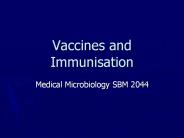Taxoids PowerPoint PPT Presentations
All Time
Recommended
Gene transcription is a process that transfers the genetic information into carriers such as mRNA and guides subsequent cellular metabolic activities. Interruption of gene transcription will result in catastrophic impacts and lead to cell death. Many of the transcription inhibitors have decent pharmacological effects against tumor growth and a number of anti-cancer drugs have been identified or developed to restrain transcription, among which amatoxins have been shown to exhibit high tumor inhibition potency
| PowerPoint PPT presentation | free to download
Vaccines and Immunisation Medical Microbiology SBM 2044 Immunisation Decrease in the incidence of infectious diseases since the middle 19th century due to: improved ...
| PowerPoint PPT presentation | free to download
... (diphteria, tetanus, pertussis) and capsular polysaccharides plus a protein carrier (Haemophilus influenzae type B polysaccharide linked to a bacterial toxoid) ...
| PowerPoint PPT presentation | free to download
Title: Improving patient care through molecular diagnostics Subject: master template Author: radcliffe_c Last modified by: Toomas Ruuben Created Date
| PowerPoint PPT presentation | free to view
Title: A View of Life Author: Valued Gateway Client Last modified by: Administrator Created Date: 12/9/2002 2:36:15 AM Document presentation format
| PowerPoint PPT presentation | free to download
OA Univ. Doz. Dr. Uwe Langsenlehner Leiter der Forschungsgruppe f r genetische Epidemiologie und Pharmakogenetik in der Onkologie an der Klinischen Abteilung f r ...
| PowerPoint PPT presentation | free to download
case of the month dr. shailesh manandhar paediatric resident 1st year iom
| PowerPoint PPT presentation | free to download
I.P No : 12153. DOA : 2062/7/12 at 9:30 pm. DOD : 2062/8/8 at 11:00 am ... Type B1 Lymphocyte rich, lymphocytic, predominantly cortical, organoid. Type B2 Cortical ...
| PowerPoint PPT presentation | free to view
Paul Ehrlich : in vivo rodent model systems to develop antibiotics 'MUSTARD GAS' 1943 : Yale Cancer Center : hematologic neoplasms, including Hodgkin's disease ...
| PowerPoint PPT presentation | free to view
Pulmonary toxicity (1) Pneumonitis/fibrosis, acute pleuritic pain, hypersensitivity, pulmonary edema. ... cardiogenic edema, pulmonary embolus, hemorrhage, ...
| PowerPoint PPT presentation | free to view
Part 1: Tumor Biology and Kinetics. Introduction of Cytotoxic Agents ... (Aromatase inhibitors, oestrogen antagonist, corticosteroids, LHRH agonist) ...
| PowerPoint PPT presentation | free to view
Patient with Cancer, but not all symptoms (and etiologies) ... Myelogram: The old gold standard. Plain X-Ray. Bone scan may help find other locations of disease ...
| PowerPoint PPT presentation | free to view
Adjuvant chemotherapy causes a temporary impairment in patients' QoL1 ... Ongoing studies are extending XT into the (neo)adjuvant setting ...
| PowerPoint PPT presentation | free to view
DNA sequencing based on automated sequencing protocol using fluorescently labeled dyes ... RRL-Oc-11 (Linalool rich) RRL-Oc-12 ( Methyl cinnamate rich) RRL- Og ...
| PowerPoint PPT presentation | free to view














